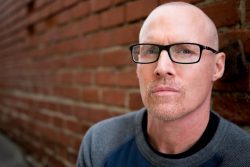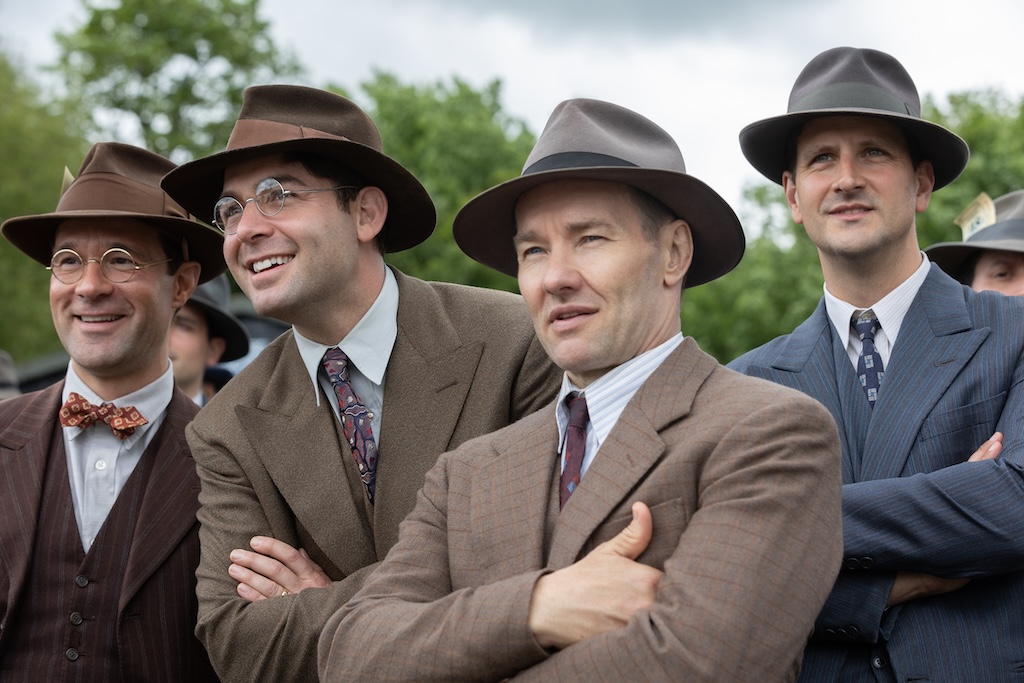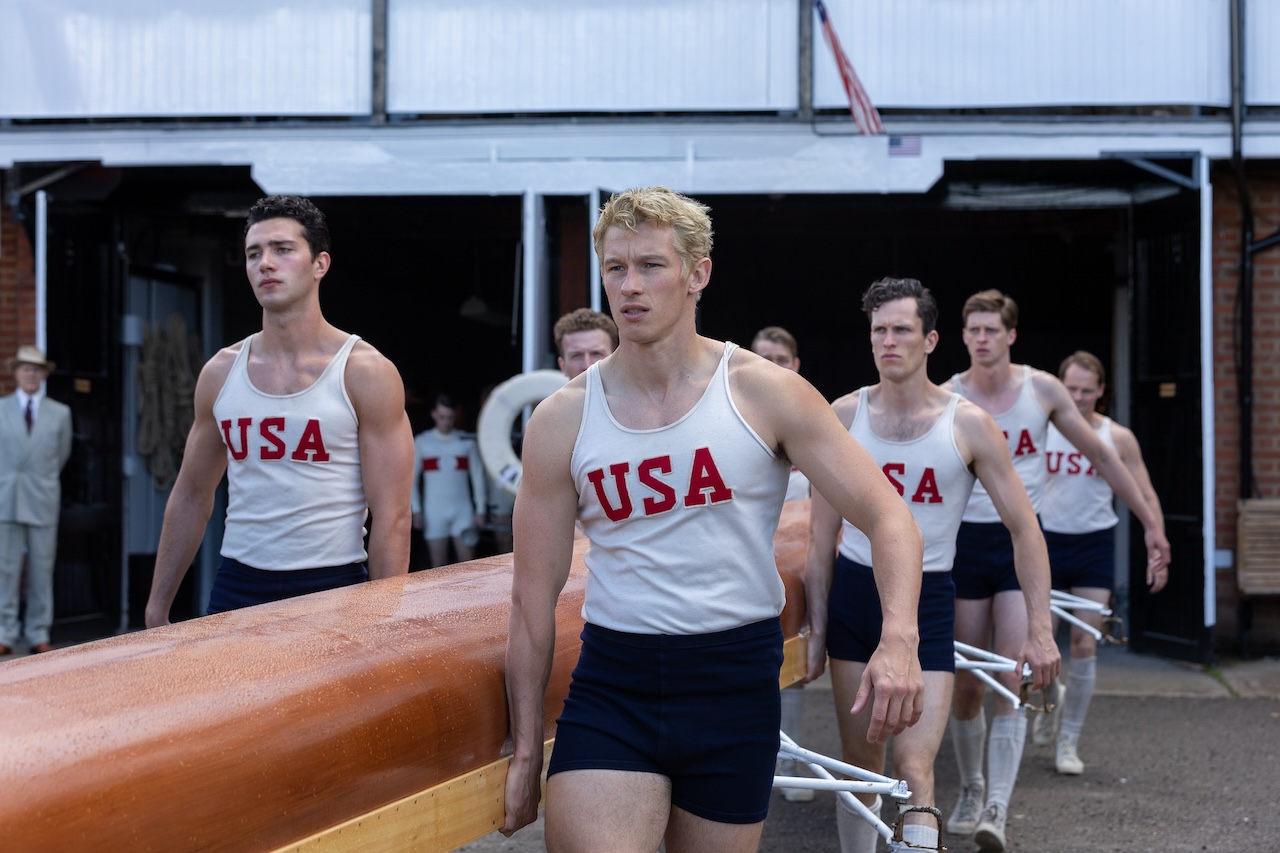“My family had a dude ranch in Colorado,” says Mark L. Smith as to why he didn’t really start writing scripts until his thirties. “We were literally in the middle of nowhere. It was a resort and we were open in the summers, but we would shut down early fall. I found I had nothing to do during those five months in the snow, so I would write.”
In those early days, he wrote stories for his children and submitted a few ideas for children’s books. Then he took a stab at writing screenplays, did a few workshops in Los Angeles, and then started to write specs, one after the other. “I just kept going, found my way through it, then got really lucky.”
Smith’s early films were in the horror genre, movies like Séance, Vacancy, and Vacancy 2: The First Cut. Then, in 2015, he hit global success with The Revenant, followed by Overlord, The Midnight Sky, The Marsh King’s Daughter, and The Boys in the Boat. Upcoming projects include Twisters and a new series called American Primeval.
“I would option and sell drama. That’s where I learned to begin with, but I couldn’t get anything made. The horror stuff was popping so I tried that. I wrote a couple of those and it became my thing, but it wasn’t what I had intended. I think I wrote The Revenant in 2007, so that’s when people noticed I could do more than horror.”
Writing The Revenant
The Revenant came out several years later in 2015. “That helped me choose the kinds of things I was doing a little bit more.” The story of a frontiersman in the 1820s is truly a story of a man against the elements. “I attacked it a little differently. My original version of the story, there was no son with him. So it changed a bit with director Alejandro Iñárritu. He wanted a more visceral feeling of why they were hunting this guy down.”

Mark L. Smith
“I love period stuff and I love characters about survival and the most basic human instinct. I leaned into that with The Revenant. It was very descriptive because I knew I didn’t have a lot of dialogue. I was also writing it on spec. It wasn’t set up or anything, so I had to make sure the read was interesting and no one would get bored with the quiet. I got detailed with the land and what it felt like.”
This encouraged Smith to play more with words and lean into the prose. He also wrote scenes such as the bear attack in great detail. “I’m going to put down what I see and give them as much as I can. They can use it or not use it. The motions and the actions of that bear attack, it was on screen just as I wrote it. But, for instance, in the script I had Glass being attacked and I would cut back to the guys, back and forth. Alejandro, genius that he is, didn’t cut back. The audience is just thrown into it.”
For this adaptation from Michael Punke’s 2015 novel, Smith says he didn’t create an outline and doesn’t outline his stories. “I don’t recommend it necessarily. I spend a lot of time beating my head against the wall. I’ve outlined in the past and it would lock me in, rather than let the story come to me. I just let it go. It requires a lot of rewriting and discovery, but adaptations are like cheating because they’re laid out for you.”
The Revenant, which he wrote on spec before he had the rights to it, was more about the overall world, so Smith did create much of the actual story. But, years later, while adapting The Boys in the Boat from the 2014 book by Daniel James Brown, the story was much more linear in nature. “You knew the beginning, middle, and end,” adds Smith.
Writing The Boys in the Boat
Directed by George Clooney, The Boys in the Boat is about the “University of Washington’s rowing team, from their Depression-era beginnings to winning gold at the 1936 Berlin Olympics.” With most of the plot laid out, Smith could focus on character and dialogue.
“Authors are such better writers than me anyways,” jokes Smith. “So, if I can just use their stuff, it makes me look better.” To pursue this non-outlining method, the screenwriter had to accept the idea that it’s simply going to take the time that it takes. It would take revisions to unlock the story.

Royal Brougham (Chris Diamantopoulos), Coach Bolles (James Wolk)
and Al Ulbrickson (Joel Edgerton) Photo by Laurie Sparham/ Metro-Goldwyn-Mayer Pictures Inc.
“I only tried outlining once or twice early on. When I first started out, it was pre-email, so I was putting scripts in the mail and you would wait weeks to hear back. By the time I heard back from that one, I would already have the next one done. I just kept learning. The self-taught thing, better or worse, you find what feels right. I probably missed some things. Probably could have made my life easier, but it works for me.”
This latest adaptation came about thanks to Smith’s adaptation of Good Morning, Midnight by Lily Brooks-Dalton. This screenplay was turned into George Clooney’s 2020 film, The Midnight Sky. “We were going out to directors, George read it and liked it. I had never read Boys in the Boat, but George, the first time we met on Midnight Sky, he asked me to write [write the adaptation for Boys].”
Smith loved everything about the story and even sent author Daniel Brown some pages for feedback. “I felt what he did was so amazing. I didn’t want to upset him,” he jokes. “As I wrote it, I created this playlist — songs from Seabiscuit, The Natural, all these sports films — and whenever I would write the races, I found myself rocking while typing, like a rower. That script, it’s my favorite thing I’ve done.”
Touch Points
There had been some earlier drafts of The Boys In The Boat that people tried to get made ten years before. “George said there were other drafts, but he didn’t even want me to read them. I just read the book. I didn’t do George any favors though. I think my draft was maybe 165 pages long. It almost needed to be a limited series to get everything in the book on the screen. So I gave George everything and let him decide where to pare it down.”
“While they had touch points like Hoosiers or The Natural, since less people are familiar with rowing, they also had to explain the sport in more detail. “In some ways, kind of like The Revenant, I was very descriptive about the training and what the oars were doing, whenever they would turn, the clank and the click. All the different things, like ‘catching a crab’ is when the oar gets stuck and hits you in the chest.”
This clarity in detail made sure the audience was caught up by the time the races began. “It’s one thing to see it on screen but to read it, I felt like it had to be something people could really wrap their heads around.” This is one of the many things Smith looks for during his revisions.
“I’m revising the entire time I’m going. My goal is always to give them a draft they feel they can shoot. I keep discovering stuff. Boys was maybe my first draft. We added a couple things. George wanted a few things and did some things on the spot, like the beginning and end with the older gentleman. It was like that with The Revenant too, I always feel like, when I write and you always make things better, what I give to them is what I think is the absolute best version.”
Writing Difficulties
As for what makes writing difficult, Smith says the obstacles have changed over time. Originally, like many screenwriters, he loved the first act and would lose the thread in the second act. “This is a great idea but I had trouble closing the door. Some of that is from not outlining or beating things out. I really like writing. I’m a very structural creature. Structure is key for me.”
“It’s such a daunting thing when you look at page 1 and it’s blank and you’ve got to do 100 pages. So I just made it a math equation. I know what’s going to happen in those first 12 pages so I just have to write 12 pages. I don’t have to write 100 pages. The first act is 28-30, so I just have to write another 15 pages. So I just break it up so it doesn’t feel so overwhelming. That helped me as much as anything, to shrink it down.”
“I love the idea of when I’ve found the character. It doesn’t always happen in the beginning. I know my first scene and how it’s going to end. The rest is discovery. Sometimes my wife will say, ‘I’ve heard these lines of dialogue.’ So I’m saying them out loud and I don’t even realize it. That’s the greatest feeling. I’ve found the character or the character found me, but I’m following them. They’re leading me. Such a great job.”
“I think for everyone who is trying, that feeling of writing, whether it’s made or optioned or anything, that feeling of writing is something to be proud of. It isn’t easy. I was lucky that we had a business where I could lock away in those winter months. I had a much easier path that way.” The mindset behind this is somewhat stoic, focused on process over results.
Now, thanks to writing dozens of scripts, he often turns out a screenplay draft in 3 – 4 weeks. “With each script, the goal was to get better. I hope someone buys that one, but if they don’t, this one will be better. I like to play golf and I find that going to the range is almost more fun than playing. It’s the same thing with writing. Trying to adjust and tweak things. The process is it. Even when things get made, I’m already past it to write the next thing. You just have to keep learning and not quit on it. Like Butch Cassidy said, ‘You just have to outlive the bastards. Keep going.’”
This interview has been condensed. Listen to the full audio version here.

